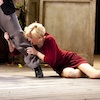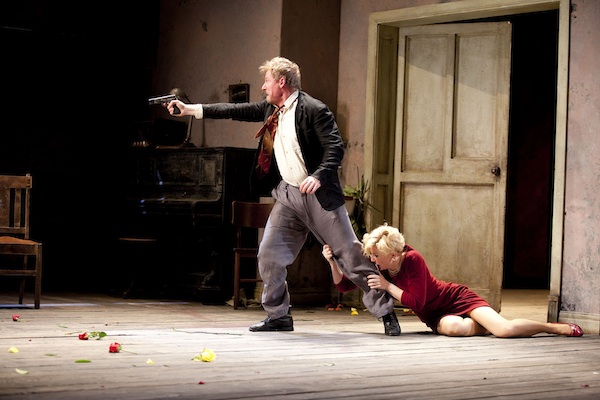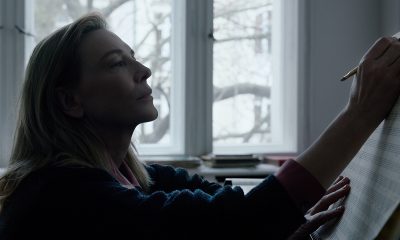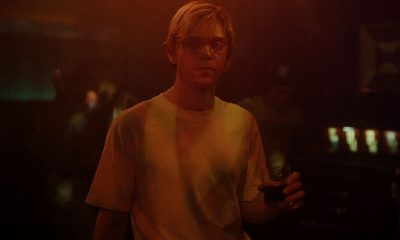Arts & Entertainment
Decadent drama
Blanchett and co. delight in Chekhov adaptation

‘Uncle Vanya’
Through Aug. 27
Sydney Theater Company
The Kennedy Center
$59-$135
202-467-4600
kennedy-center.org
Only a few big movies stars shine onstage like they do on screen. Cate Blanchett is one of them. She proved this to local audiences two summers ago with her compelling portrayal of Blanche Dubois in Sydney Theatre Company’s “A Streetcar Named Desire.” Now she’s back at the Kennedy Center confirming her sizable gift as beautiful Yelena in the company’s take on Anton Chekhov’s classic tragicomedy, “Uncle Vanya.”
Staged by Hungarian director Tamás Ascher, it’s an original, bold production that bursts with antic energy, laughter, sadness and self-imposed misery. Blanchett and the rest of the excellent nine-person ensemble cast take chances plumbing the material for all its humor and pathos and the results are terrific.
From her first entrance, Blanchett’s Yelena makes it painfully obvious that country life is not for her. With her white cat-eye framed sunglasses and silk scarf, she is dressed more for paparazzi dodging than walking the grounds of a crumbling estate in the summer heat. Her much older husband, professor Serebryokav (John Bell), looks equally out of place in his citified trench coat and galoshes. Indeed, they’d both prefer to be in town, but straightened circumstances dictate otherwise.
The estate is run by plain and stalwart Sonya (Hayley McElhinney), the professor’s daughter with his late first wife, and her unhappy Uncle Vanya (a marvelously depressed Richard Roxburgh). Vanya was once the professor’s biggest fan working tirelessly on the estate so the professor could concentrate on loftier pursuits, but no more. Vanya has grown disillusioned with his ex-idol. At 47, he feels cheated by life. Making matters worse Vanya is in love with the professor’s beautiful wife.
Totally bored and indifferent to her husband, Yelena alternates from icily poised to warm and almost goofy, but mostly she is restless. And while Vanya’s romantic advances repulse her, she does feel something for the visiting doctor Astrov (played superbly by Hugo Weaving, best known for the film, “The Adventures Priscilla: Queen of the Desert”). Though coarsened by a decade of hard work and vodka, Astrov remains charming and sensitive. Forward thinking like the playwright (Chekhov was also a physician), the doctor is obsessed with preventing the deforestation of the countryside. In fact, he delivers a monologue with a strong environmental message that strongly resonates today more than a century later.
Regardless of Astrov’s recommendation that Russians spare trees and extract fuel from the earth, a workman can be seen frequently chopping wood in the background. And despite (or because of) the doctor’s aversion to felled trees, Zsolt Khell’s set is mostly timber. The interior of the formerly grand but now rundown house is backed by a huge wall of weathered planks and firewood is stacked here and there.
Working from a lively adaptation by Andrew Upton (Blanchett’s husband with whom she runs Australia’s Sydney Theatre Company), Ascher rather brilliantly moves the action from turn-of-the-century Tsarist Russia to mid-1950s Soviet Union. There is no romantic descent into genteel poverty or hope for the future. The atmosphere is more stultifying than ever: as pesky flies drone, radio static hums, the household grows increasingly on edge, ultimately erupting in bursts of violence. And when they’re not fighting, the extended family goes in for demonstrations of remorse, friendship and passion. Also included throughout are some very funny uncomfortable silences, pratfalls and drunken interludes, but nothing feels the least forced when executed by this top-notch group of Aussie actors.
Tall and slim with chicly styled white-blonde hair, Blanchett stands out like a bright light and Györgyi Szakács’ gorgeous costumes only up the wattage. While the others sport baggy earth tones, her Yelena draws attention in a tight red dress and is equally fetching in the crisp gray traveling suit she wears to give the doctor a bracing farewell kiss before beating a hasty exit back to the city.

Team DC, the umbrella organization for LGBTQ-friendly sports teams and leagues in the D.C. area, held its annual Night of Champions Awards Gala on Saturday, April 20 at the Hilton National Mall. The organization gave out scholarships to area LGBTQ student athletes as well as awards to the Different Drummers, Kelly Laczko of Duplex Diner, Stacy Smith of the Edmund Burke School, Bryan Frank of Triout, JC Adams of DCG Basketball and the DC Gay Flag Football League.
(Washington Blade photos by Michael Key)




















The 2024 National Cannabis Festival was held at the Fields at RFK Stadium on April 19-20.
(Washington Blade photos by Michael Key)
















Covering the @NatlCannaFest at RFK Stadium for @WashBlade . Stop by the LGBTQ+ booth and pick up a paper if you are here. pic.twitter.com/is7hnsaPns
— Michael Patrick Key (@MichaelKeyWB) April 20, 2024
Theater
‘Amm(i)gone’ explores family, queerness, and faith
A ‘fully autobiographical’ work from out artist Adil Mansoor

‘Amm(i)gone’
Thorough May 12
Woolly Mammoth Theatre
641 D St., N.W.
$60-$70
Woollymammoth.net
“Fully and utterly autobiographical.” That’s how Adil Mansoor describes “Amm(i)gone,” his one-man work currently playing at Woolly Mammoth Theatre.
Both created and performed by out artist Mansoor, it’s his story about inviting his Pakistani mother to translate Sophocles’s Greek tragedy “Antigone” into Urdu. Throughout the journey, there’s an exploration of family, queerness, and faith,as well as references to teachings from the Quran, and audio conversations with his Muslim mother.
Mansoor, 38, grew up in the suburbs of Chicago and is now based in Pittsburgh where he’s a busy theater maker. He’s also the founding member of Pittsburgh’s Hatch Arts Collective and the former artistic director of Dreams of Hope, an LGBTQ youth arts organization.
WASHINGTON BLADE: What spurred you to create “Amm(i)gone”?
ADIL MANSOOR: I was reading a translation of “Antigone” a few years back and found myself emotionally overwhelmed. A Theban princess buries her brother knowing it will cost her, her own life. It’s about a person for whom all aspirations are in the afterlife. And what does that do to the living when all of your hopes and dreams have to be reserved for the afterlife?
I found grant funding to pay my mom to do the translation. I wanted to engage in learning. I wanted to share theater but especially this ancient tragedy. My mother appreciated the characters were struggling between loving one another and their beliefs.
BLADE: Are you more director than actor?
MANSOOR: I’m primarily a director with an MFA in directing from Carnegie Mellon. I wrote, directed, and performed in this show, and had been working on it for four years. I’ve done different versions including Zoom. Woolly’s is a new production with the same team who’ve been involved since the beginning.
I love solo performance. I’ve produced and now teach solo performance and believe in its power. And I definitely lean toward “performance” and I haven’t “acted” since I was in college. I feel good on stage. I was a tour guide and do a lot of public speaking. I enjoy the attention.
BLADE: Describe your mom.
MANSOOR: My mom is a wonderfully devout Muslim, single mother, social worker who discovered my queerness on Google. And she prays for me.
She and I are similar, the way we look at things, the way we laugh. But different too. And those are among the questions I ask in this show. Our relationship is both beautiful and complicated.
BLADE: So, you weren’t exactly hiding your sexuality?
MANSOOR: In my mid-20s, I took time to talk with friends about our being queer with relation to our careers. My sexuality is essential to the work. As the artistic director at Dreams of Hope, part of the work was to model what it means to be public. If I’m in a room with queer and trans teenagers, part of what I’m doing is modeling queer adulthood. The way they see me in the world is part of what I’m putting out there. And I want that to be expansive and full.
So much of my work involves fundraising and being a face in schools. Being out is about making safe space for queer young folks.
BLADE: Have you encountered much Islamophobia?
MANSOOR: When 9/11 happened, I was a sophomore in high school, so yes. I faced a lot then and now. I’ve been egged on the street in the last four months. I see it in the classroom. It shows up in all sorts of ways.
BLADE: What prompted you to lead your creative life in Pittsburgh?
MANSOOR: I’ve been here for 14 years. I breathe with ease in Pittsburgh. The hills and the valleys and the rust of the city do something to me. It’s beautiful, it’ affordable, and there is support for local artists. There’s a lot of opportunity.
Still, the plan was to move to New York in September of 2020 but that was cancelled. Then the pandemic showed me that I could live in Pittsburgh and still have a nationally viable career.
BLADE: What are you trying to achieve with “Amm(i)gone”?
MANSOOR: What I’m sharing in the show is so very specific but I hear people from other backgrounds say I totally see my mom in that. My partner is Catholic and we share so much in relation to this.
I hope the work is embracing the fullness of queerness and how means so many things. And I hope the show makes audiences want to call their parents or squeeze their partners.
-

 South America4 days ago
South America4 days agoDaniel Zamudio murderer’s parole request denied
-

 Maryland4 days ago
Maryland4 days agoMontgomery County police chief discusses arrest of trans student charged with planned school shooting
-

 Commentary5 days ago
Commentary5 days agoWorld ‘isn’t much different today’
-

 Theater4 days ago
Theater4 days ago‘Amm(i)gone’ explores family, queerness, and faith










